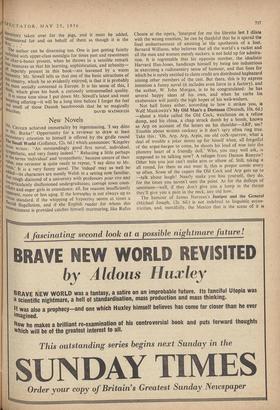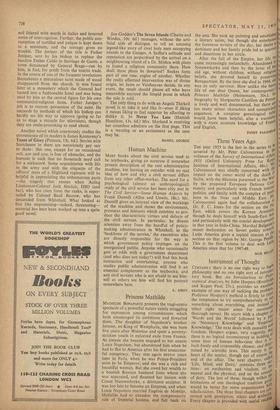New Novels
CRUGER achieved immortality by ingeminating, 'I say ditto 414) Mr. Burke!' Opportunity for a reviewer to draw at least th°41entary attention to himself is offered by the girdle round e Small World (Gollancz, 12s. 6d.) which announces: 'Kingsley „ Is writes: "An outstandingly good first novel, individual, 1Pathetic, and very funny indeed."' Relucting a little perhaps vt the terms 'individual' and 'sympathetic,' because unsure of their one reviewer is quite ready to repeat, 'I say ditto to Mr. actrilAis.' It is a very funny novel. The 'indeed' may as well be ihued—its characters are mostly Welsh in a setting now familiar, t„at rough diamond of a university with professors pour rire and !! e'po•articulately disillusioned undergraduates; corrupt town coun- ,11°rs and eager girls in attendance; all, for reasons insufficiently .Parent, more or less agog. If the horseplay is not always up to nrcus standard, if the whipping of hypocrisy seems at times a .accid flagellation, and if the English reader for whom this 'fltert.
Ainment is provided catches himself murmuring, like Rufus Choate at the opera, 'Interpret for me the libretto lest I dilate with the wrong emotion,' he can be thankful that he is spared the final embarrassment of assisting at the apotheosis of a lout. Bernard Williams, who believes that all the world's a racket and all the men and women merely suckers, is not held up for admira- tion. It is regrettable that his opposite number, the idealistic Harvard Ifan-Jones, handicaps himself by being too industrious in exercising a rudimentary sense of humour, and that lines for which he is surely entitled to claim credit are distributed haphazard among other members of the cast. But there, this is by express intention a funny novel (it includes even farce in a factory), and the author, W. John Morgan, is to be congratulated: he has several happy ideas of his own, and when he curbs his exuberance will justify the high hopes of his well-wishers.
Not half funny either, according to how it strikes you, is Wolf Mankowitz's My Old Man's a Dustman (Deutsch, 10s. 6d.) —about a bloke called the Old Cock, watchman on a refuse dump, and his china, a chap struck dumb by a bomb, known as Arp on account of the letters on his shoulder—ARP, see? Trouble about written cockney is it don't very often ring true. Take this: 'Oh, Arp, Arp, Arpie, me old coak-sparrow, what a deal of trouble a joker stores up for hisself when, all forgetful of the argee-bargee to come, he shoots his load of woe into the plummy heart of a friendly doll.' Who, you may. well ask, is supposed to be talking now? A refugee from Damon Runyon? Other bits you just can't make arm or elbow of. Still, taking it all round, for them as can wear it, this is proper comic every so often. Some of the capers the Old Cock and Arp gets up to —talk about laugh! Nearly make you hiss yourself, they do, for the times you haven't seen the point. As for the dollops of sentiment—well, if they don't give you a lump in the throat they'll give you a pain in the neck, any old how.
The humour of James Norman's Juniper and the General (Michael Joseph, 12s. 6d.) is not indebted to linguistic eccen- tricities, and, mercifully, the Mexico that is the scene of it is
noi littered with words in italics and inverted notes of interrogation. Further, the public con- sumption of tortillas and pulque is kept down to a minimum, and the coinage gives no trouble. The juniper of the title is Father Juniper, sent by his bishop to replace the inactive Father Cold° in Santiago de Gante, a town dominated by General Braga—run by him, in fact, for profit from the tourist trade. In the course of one of the frequent revolutions thereabouts a miraculous saint made of wood disappeared from the church. It was found later at a monastery which the General had turned into a fashionable hotel and was being used by him as the central figure for his own commercial-religious fiesta. Father Juniper's job is to recover possession of the saint. He succeeds by methods of which his bishop can hardly see his way to approve (going so far as to stage a miracle for television), though they are smile-provoking to read about.
Another novel which courteously studies the convenience of its readers is James Kennaway's Tunes ot Glory LPutnam, 13s. 6d.). Stories with Scotchrnen in them are notoriously gey sair to thole: this one, except for an occasional och, aye and yon, is free of obstacles, and the humour is such that no Sassenach need call for a corkscreW. Some acquaintance with life in the army and with the etiquette of the officers' mess of a Highland regiment will be helpful in appreciating the unhumorous parts —the tragedy that ensues when Acting Lieutenant-Colonel Jock Sinclair, DSO (and bar), who has risen from the ranks, is super- seded by Colonel Basil Barrow, who has descended from Whitehall. What looked at first like unpromising—indeed, threatening— material has here been worked up into a quite good novel. Jon Godden's The Seven Islands (Chatto and Windus,, 10s. 6d.) manages, without the arti- ficial aids of dialogue, to tell an amusing legend-like story of rival holy men occupying islands in the Ganges. A Sadhu's solitude and reputation are jeopardised by the arrival on a neighbouring island of a Dr. Mishra with plans to found a religious community there. How shall these plans be thwarted? Snakes form part of one ruse, eagles of another. Whether the really effectual intervention was of divine origin, let Jains or Vaishnavas decide. In any event, the result should please all who have meanwhile enjoyed the limpid prose in which the tale is told. '
The only thing to do with an Angela Thirkell novel is to take it and like it—even if liking it means liking to feel superior by affecting to dislike it. In Never Too Late (Hamish Hamilton, 13s. 6d.) Mrs. Morland is receiving her countless admirers on the first page. This is a warning or an enticement as the case may be.
DANIEL GEORGE











































 Previous page
Previous page